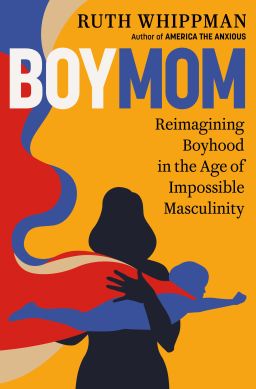Get inspired by a weekly roundup on living well, made simple.?Sign up for CNN’s Life, But Better newsletter for information and tools designed to improve your well-being.
I know I’m not the only parent who has lost sleep worrying about the future of my sons.
My 16-year-old has begun to drive, and I have concerns about his ability to navigate curbs. My 11-year-old son loves to play video games, but I have to be careful about his choice of online gaming communities. Some are extremely toxic.
But even with those worries, I have some leverage, whether it’s the keys or the Wi-Fi password.
It’s the things I can’t control that keep my mind running all night. It’s a scary road for a parent to contemplate because of what I see out there. There is the “manosphere,” the collection of male influencers who plant seeds of hate in our young boys’ ears. That self-hate can turn inward until it explodes, either in self-harm, partner violence or mass shootings.
That’s what keeps me up at night.

That’s what Ruth Whippman tackles in her new book, “BoyMom: Reimagining Boyhood in the Age of Impossible Masculinity,” which published on Tuesday.
“I was pregnant with my third son when the #MeToo movement just exploded,” Whippman told me. “I realized at that moment there was just this rolling horror show of bad news about men.”
The journalist, cultural critic and documentary filmmaker realized that #MeToo was exposing a “deep, systemic problem” with the way that we raise and socialize boys. “The fact that this experience of sexual violence and sexual assault is so common — there is somewhere that we’re going wrong. It’s clearly a blind spot.”
Whippman takes her audience into those influences our boys are exposed to, including the incel population, the pull of the false machismo of men influencers and the world that our sons are expected to join as adults.
I sat down with Whippman to learn about her experiences as a boy mom, what worries her as a parent and the surprising things she discovered during research for her book.
This conversation has been edited and condensed for clarity.
CNN: You start “BoyMom” with an interesting fact that baby boys are not nurtured as much as girls. How so?
Ruth Whippman: They’re about six weeks behind baby girls (in development), so a baby boy needs more help with self-regulating with emotions. They need more early care, but they get less. And there is a ton of research and studies that show that.
But the way that parents respond to baby boys — they project all these masculine qualities into them. So, when they cry, parents assume they’re angry rather than sad, and they pick them up less. They give them less positive touch. They use less emotional language. This is a pattern that goes on all the way through childhood into adulthood. So, all of the things that we think of as caregiving and nurturing — baby girls receive more of that. So, boys need more, and they get less. That has really long-term implications for the development of empathy, social skills and morality.
CNN: As boys grow, you say that they are not taught relationship skills or emotional development. The stories we read to boys are different than what we read to girls.
Whippman: This is something that really surprised me, because it was so invisible to me that this was even absent. It would have been so normal for me to read about relationships as a young girl. My boys will never read a story like that unless I actively go and give it to them.
There are very, very few role models for boys or stories for boys — movies, TV shows and books — where (boys) are saying that they have to take on emotional labor, that they have to think about other people’s feelings, track them and worry about letting somebody down.
Their stories are always about adventure, battles and fighting. It all contributes to boys not growing up with a model of how to be a fully formed, relational, connected human being. I see it with my kids all the time.
CNN: What pressures does society put on boys as they reach school age?
Whippman: We give boys this vision that’s all about being almost superhuman in the hero narratives and these stories where boys see themselves as being special and important and the main character — but they have to be emotionally invulnerable. They can’t admit to weakness or admit to (having) feelings.
They have to be the best. They have to be better than girls and women. The story is that boys get girls, and women generally tend to be these kinds of side characters that boys get as prizes for being heroes. The damaging part of it is that in a million ways we communicated to boys that they need to be strong. They need to be stoic. They can’t admit their feelings, that they can’t be weak. We teach that sort of intimacy and vulnerability goes for women, but not men. So, I think this has a huge impact on their mental health.
CNN: How does that translate into how they act in school and with their peers?
Whippman: Boys’ issues are seen as behavioral problems rather than emotional deficiencies. We see boys as this kind of angry, masculine characters that are acting out rather than the sort of vulnerable emotional beings they are.
We tell them it’s shameful to be sad and to cry and to show weakness. We teach them to cope with their emotions such as anger or destructiveness on their own. We don’t give them other outlets or other tools to express their emotions. We don’t see the hurt and the emotions behind it. They’re scared to reach out, and they don’t get the help they need.
They get deeper and deeper into these toxic spaces. On the one hand, they’re the most hate-filled, horrifying, misogynistic, racist spaces. But there’s also this brotherhood amongst many of them. These are spaces where they find connection, and I think that is the problem.

CNN: Explain the term incel. In “BoyMom,” you spend time with this population. Who are they?
Whippman: They’re kind of unique within the manosphere because they are the guys who are (considered) losers in this system, as they say themselves. Involuntarily celibate. They’re very lonely, generally very depressed, and they’ve given up hope. They think feminists are to blame for everything and men are the real victims. This is very twisted, very horrible politics, and it comes along with a lot of misogyny. You can’t get women because it’s predecided (by this system).
CNN: What were the biggest surprises for you when talking with the involuntary celibate?
Whippman: One was that the of level of connection and brotherhood and tenderness between men, which was really shocking to me. I was so surprised that in all the places to find it, it was there and then. I mean a lot of them are horrifying misogynists. And I went in depth with one guy who really was like that. But I think I saw a lot of just sadness and trauma and feeling stuck and feeling like they had no hope to get anywhere else.
They couldn’t really see therapy. They thought they’d been boxed so far into this corner that if they went to talk to a therapist, that they would get rejected and told the same narrative, which is “you’re so privileged, shut up.” Which I think is a real narrative in our culture.
One of the biggest surprises was I expected incels to be these very fringe people, who were saying something completely different from the kind of so-called regular boys would say. It really shocked me just how similar they were to many of the sort of so-called regular boys that I talked to. That all the concerns that they were raising about loneliness, about friendship, about masculinity, about feeling emasculated, about the pressures of masculinity, all those things were actually just very mainstream.
CNN: Did you find any correlation between their father’s masculinity and behavior and their own judgment of themselves?
Whippman: Several guys said to me that their father had always said, “Man up.” I think that fathers are probably doing this out of love.?I think fathers often encourage their boys to be tough and masculine and not to cry or express emotions out of love, because that is how they were taught, and that is how they think their sons need to be to survive in the?world.
They want to protect their sons and (are) probably doing it the best way they know how because that’s how they were taught. But these messages are so harmful, and they have lasting consequences. I saw it all over with boys who have different backgrounds.
CNN: How do we reconcile these two halves of men? How do we keep traditionally masculine-identified values such as courage and assertiveness, and encourage feminine-identified values such as empathy and sensitivity?
Whippman: We start from the beginning. Take the gendered expectations out of those words. Bravery, courage, strength, assertiveness, empathy, humanity, nurturing and caregiving are human qualities. Get away from girls do this, boys do that. Then we would give people, boys and girls, more ability to be fully human.
CNN: How do we as individual men support the boys and men in our lives?
Whippman: We need to change the cultural conversation and give respect and admiration to the men who are trying to change the narrative and the women who are trying to help them in that effort.
In the home, I think it’s about making time for emotions with boys. Try to see boys as these emotional things, give them role models who express emotions, whether that’s in real life from dads, families and communities.
Boys and men don’t have the vocabulary to talk about this problem. We don’t know what to even call the harm that the patriarchy has caused to men. The more we talk about it, the more we can name it, the more we can correct it.
Shannon Carpenter is a writer, author of the book “The Ultimate Stay-at-Home Dad” and married father of three.




